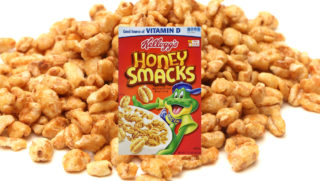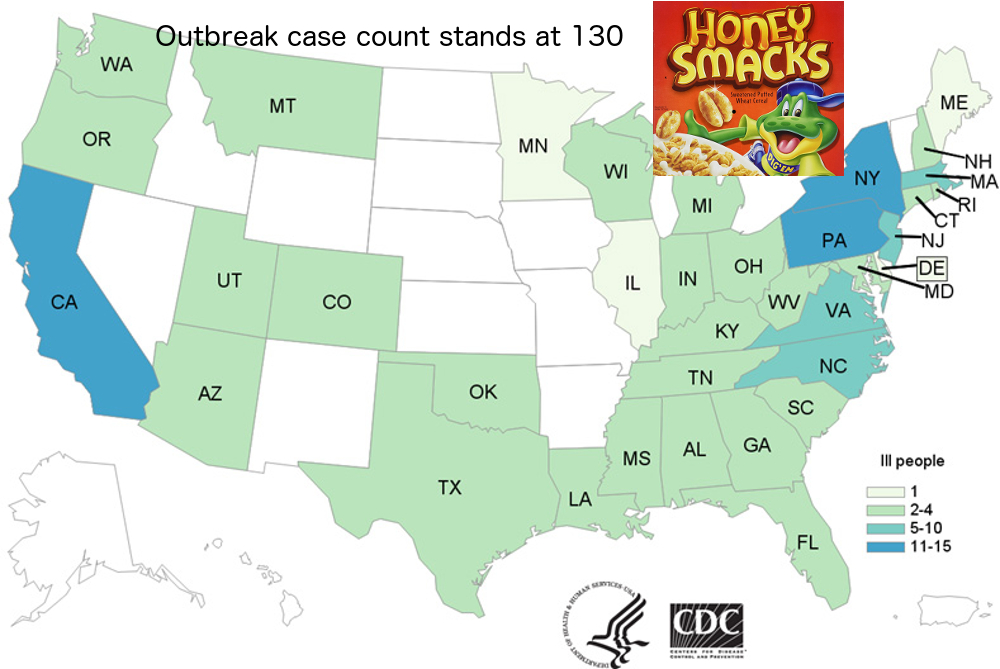Although the Kellogg Co. recalled all of its Honey Smacks cereal in June because a Salmonella outbreak was traced to it, federal officials report the sugar-coated puffed wheat is still being sold. Meanwhile, more people in more states are sick.
This week marks the second time outbreak investigators have warned the public that the recalled cereal is still available for purchase.
“The FDA has learned that some retailers are still selling this product,” the Food and Drug Administration reported July 12. “The FDA will continue to monitor this situation closely and follow up with retailers as we become aware of recalled products being offered for sale.”
Since that July 12 outbreak update, 30 more people have been added to the case count, bringing the total of confirmed illnesses to 130. The sick people are spread across 36 states, with Delaware, Minnesota and Maine now reporting patients. Kellogg distributed the Honey Smacks nationwide and to Guam and Saipan, and several foreign countries.
Public health officials are asking consumers who see Honey Smacks for sale to immediately contact the FDA Consumer Complaint Coordinator in their region. No Honey Smacks should be available at any stores, restaurants, institutional dining halls such as school cafeterias, or on the internet. It is against federal law to sell or give away recalled food.
“The Kellogg Co. recalled all Honey Smacks products that were on the market within the cereal’s one-year shelf-life. However, Honey Smacks products with earlier dates could also potentially be contaminated,” according to Tuesday’s outbreak update from the Centers for Disease Control and Prevention.
Both the CDC and the Food and Drug Administration are renewing their warnings to consumers and retailers to not eat, serve or sell any Kellogg’s Honey Smacks cereal, regardless of package sizes or best-before date codes. Outbreak investigators continue to be concerned that people may still have unused portions of the recalled cereal in their homes.
 “People who recently became ill report eating Kellogg’s Honey Smacks cereal that they had in their homes. Do not eat Kellogg’s Honey Smacks cereal of any size package or with any ‘best if used by’ date,” the CDC update said.
“People who recently became ill report eating Kellogg’s Honey Smacks cereal that they had in their homes. Do not eat Kellogg’s Honey Smacks cereal of any size package or with any ‘best if used by’ date,” the CDC update said.
The illness onset dates for the outbreak patients range from March 3 through Aug. 7. However, the CDC says illnesses that began after Aug. 4 might not yet be included in the data because of the time it takes between when a person becomes ill and when their illness is reported. This takes an average of 2 to 4 weeks with Salmonella infections.
Of the outbreak patients with the information available, 35 percent have had to be admitted to hospitals, according to the CDC. Public health agencies have not confirmed any deaths. The ages of the infected people range from 1 to 95 years old, with a median age of 57. The U.S. outbreak updates do not indicate whether there have been any illnesses in foreign countries.
The FDA has been investigating the outbreak since May 17, which is when the agency says it was informed of a cluster of Salmonella Mbandaka illnesses in multiple states.
“In the following weeks, the FDA, CDC, and state partners worked together to collect additional information to identify a food item of interest. Interviews with ill people allowed health partners to identify Kellogg’s Honey Smacks cereal as a possible source of the illnesses,” according to the FDA. “As a result of discussions with the Kellogg company and the contract manufacturer, on June 14 the Kellogg Co. voluntarily recalled Honey Smacks cereal.”
After the initial recall, the Kellogg Co. reported it distributed the implicated cereal to foreign countries of Netherlands Antilles also known as Aruba/Curaçao/Saint Maarten; the Bahamas; Barbados; Tortola also known as British Virgin Islands; Costa Rica; Guatemala; Haiti; Mexico, Panama; and Tahiti also known as French Polynesia.
Neither government officials nor the Kellogg Co. have released the name of the contractor that produced the recalled cereal for Kellogg.
Advice to the public
The CDC recommends the following measures to anyone who finds they have Honey Smacks cereal in their homes:
- Do not eat any Kellogg’s Honey Smacks cereal. This advice applies to Honey Smacks in any size package and with any “best if used by” date.
- Throw out the cereal or return it for a refund.
- If you have cereal that looks like Kellogg’s Honey Smacks in a container without the packaging, and don’t remember the brand or type, throw it away.
Kellogg’s Honey Smacks is an oval-shaped, sweetened puffed wheat cereal with a golden brown color. The CDC warns that any container used for the cereal should be thoroughly washed with warm, soapy water before using it again, to remove harmful germs that could contaminate other food.
Anyone who has eaten Honey Smacks cereal and developed symptoms of Salmonella infection should seek medical attention. Sick people should tell their doctors about their possible exposure to Salmonella because special lab tests are required to properly diagnose the infections.
Symptoms usually begin within a week after exposure to the bacteria. Most people infected with Salmonella develop diarrhea, fever, and abdominal cramps. In otherwise healthy adults, Salmonella infections usually last four to seven days.
However, people in high-risk groups, which include children, older adults, pregnant women and anyone with a compromised immune system can develop serious complications which require hospitalization.
(To sign up for a free subscription to Food Safety News, click here.)

